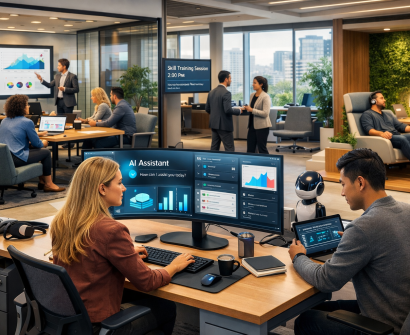Currently Empty: $0
How One Tech Skeptic Decided A.I. Might Benefit the Middle Class

David Autor seems an unlikely A.I. optimist. The labor economist at the Massachusetts Institute of Technology is best known for his in-depth studies showing how much technology and trade have eroded the incomes of millions of American workers over the years.
But Mr. Autor is now making the case that the new wave of technology — generative artificial intelligence, which can produce hyper-realistic images and video and convincingly imitate humans’ voices and writing — could reverse that trend.
“A.I., if used well, can assist with restoring the middle-skill, middle-class heart of the U.S. labor market that has been hollowed out by automation and globalization,” Mr. Autor wrote in a paper that Noema Magazine published in February.
Mr. Autor’s stance on A.I. looks like a stunning conversion for a longtime expert on technology’s work force casualties. But he said the facts had changed and so had his thinking.
Modern A.I., Mr. Autor said, is a fundamentally different technology, opening the door to new possibilities. It can, he continued, change the economics of high-stakes decision-making so more people can take on some of the work that is now the province of elite, and expensive, experts like doctors, lawyers, software engineers and college professors. And if more people, including those without college degrees, can do more valuable work, they should be paid more, lifting more workers into the middle class.
The researcher, whom The Economist once called “the academic voice of the American worker,” started his career as a software developer and a leader of a computer-education nonprofit before switching to economics — and spending decades examining the impact of technology and globalization on workers and wages.
Mr. Autor, 59, was an author of an influential study in 2003 that concluded that 60 percent of the shift in demand favoring college-educated workers over the previous three decades was attributable to computerization. Later research examined the role of technology in wage polarization and in skewing employment growth toward low-wage service jobs.
Other economists view Mr. Autor’s latest treatise as a stimulating, though speculative, thought exercise.
“I’m a great admirer of David Autor’s work, but his hypothesis is only one possible scenario,” said Laura Tyson, a professor at the Haas School of Business at the University of California, Berkeley, who was chair of the Council of Economic Advisers during the Clinton administration. “There is broad agreement that A.I. will produce a productivity benefit, but how that translates into wages and employment is very uncertain.”
That uncertainty usually veers toward pessimism. Not just Silicon Valley doomsayers, but mainstream economists predict that many jobs, from call center workers to software developers, are at risk. In a report last year, Goldman Sachs concluded that generative A.I. could automate activities equivalent to 300 million full-time jobs globally.

In Mr. Autor’s latest report, which was also published in the National Bureau of Economic Research, he discounts the likelihood that A.I. can replace human judgment entirely. And he sees the demand for health care, software, education and legal advice as almost limitless, so that lowering costs should expand those fields as their products and services become more widely affordable.
It’s “not a forecast but an argument” for an alternative path ahead, very different from the jobs apocalypse foreseen by Elon Musk, among others, he said.
Until now, Mr. Autor said, computers were programmed to follow rules. They relentlessly got better, faster and cheaper. And routine tasks, in an office or a factory, could be reduced to a series of step-by-step rules that have increasingly been automated. Those jobs were typically done by middle-skill workers without four-year college degrees.
David Autor, an M.I.T. economist and tech contrarian, argues that A.I. is fundamentally different from past waves of computerization.
Source: GWFM Research & Study








